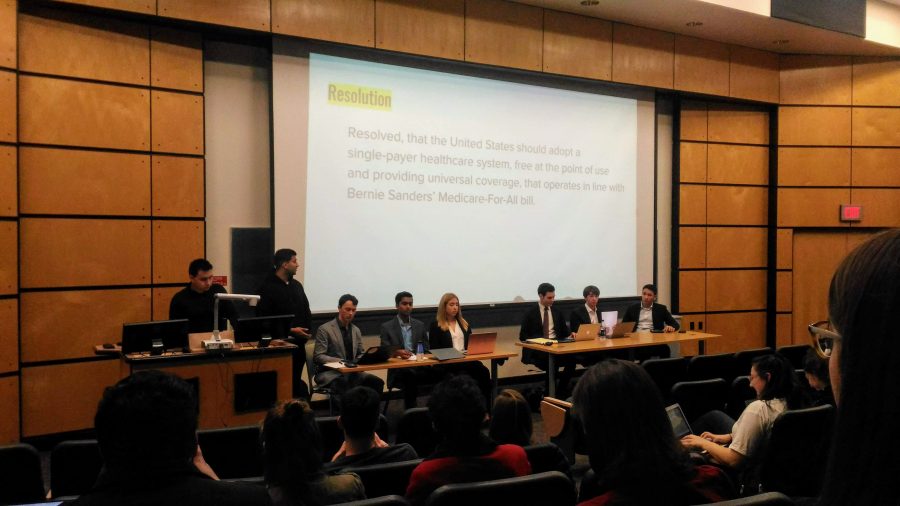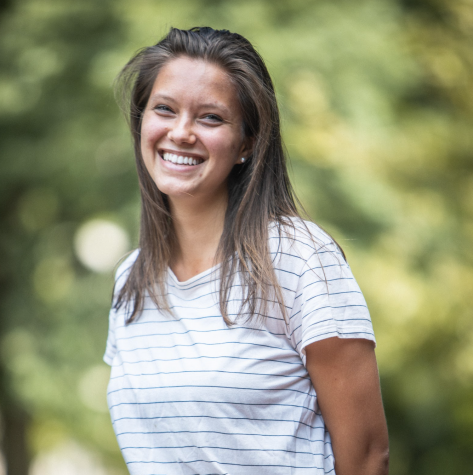“I’m guessing most people in this crowd are liberal,” Vanderbilt College Republican Andrew Talley said in his opening statement to Tuesday night’s debate about US healthcare policy. “I genuinely do appreciate the fact that you’ve come out to hear us talk about health care and to question whether or not we’re right.”
Over 90 students showed up to Furman Hall to hear the Vanderbilt College Republicans (VCR) and Vanderbilt College Democrats (VCD) debate two questions: Does the government have an obligation to provide healthcare to its citizens? And would universal healthcare be feasible for the US? VCD and VCR collaborated to choose a topic and structure for the debate.
“We want to make sure that this debate isn’t just each team talking past each other,” VCD Debater Will Newell said. “We want to make sure that it’s more than just dueling speeches, so we have a lot of time for questions.”
Newell debated alongside Eva Durchholz and Keshav Kundassery to represent VCD. Andrew Talley, Danny Harris and Nicholas Fauchet represented VCR. Members of the Vanderbilt Political Review facilitated the event, keeping time and taking audience questions.
The debate began with a brief opening statement from each team, and then the teams each had a total of six minutes to take turns arguing their main points. Next, the teams cross-examined each other, answered four audience questions, and gave their closing statements.
VCD argued that the US government has an obligation to provide healthcare to all its citizens and that it would be feasible for the US to do so. Debaters stressed that our current system prevents many Americans from receiving potentially life-saving care.
“If there’s someone right in front of you who you can save, you are obligated– you have a duty –to save that person. It’s the Golden Rule,” Newell said.
VCR agreed that the US’s current healthcare system is insufficient. However, VCR members argued that a free market system without government regulation would solve the problem better than a single-payer system could.
“If you want to know why healthcare costs are going up in the United States, it’s because of government regulation. In every other place that we let free markets break down the cost of care, it’s bringing down the cost of goods. We can do the same with health care,” VCR Debater Andrew Talley said.
Both sides pointed to successful healthcare systems around the world in places like Singapore, Canada, and Switzerland. The debate touched on issues of wait times, elective vs. non-elective procedures, whether healthcare is a right, and socialism, but neither side could fit everything they wanted to say into the one hour debate.
“We could have talked for days,” VCR Debater Harris said.
During the period for audience questions, one student asked the VCR team how their proposal would address systemic inequalities endemic to the healthcare system. Unfair healthcare policies disproportionately affect African Americans, but neither team had addressed this side of the issue, she said.
Harris acknowledged her concerns, but argued that polices like universal basic income or earned income tax credits would address inequalities more directly than a single-payer healthcare model would. The VCD team disagreed.
“Insofar as you have a history of systemic racism that has caused socioeconomic differences, those disparities are going to bear themselves out in healthcare. That’s why we need universal healthcare with no cost-sharing because then you get past those socioeconomic barriers,” Newell said.
Newell and Harris agreed that debates like this one improve campus culture. Schoolwork and extracurriculars easily obscure important political issues, but organizations like VCD and VCR help student engage politically on campus, Newell said.
“Events like this where everyone gets together and is able to talk about what they believe shows why I think our country and our school are so great: because we have freedom of expression,” Harris said.
For students like Sophomore Elise Gobbo, that’s what this kind of debate is all about.
“I like hearing the other side,” Gobbo said. “I’m very liberal, but I think it’s always interesting to see what arguments our side comes up with and how that’s countered, and different ways people are thinking about the issue.”
Eva Durchholz is a campus writer on The Hustler.



